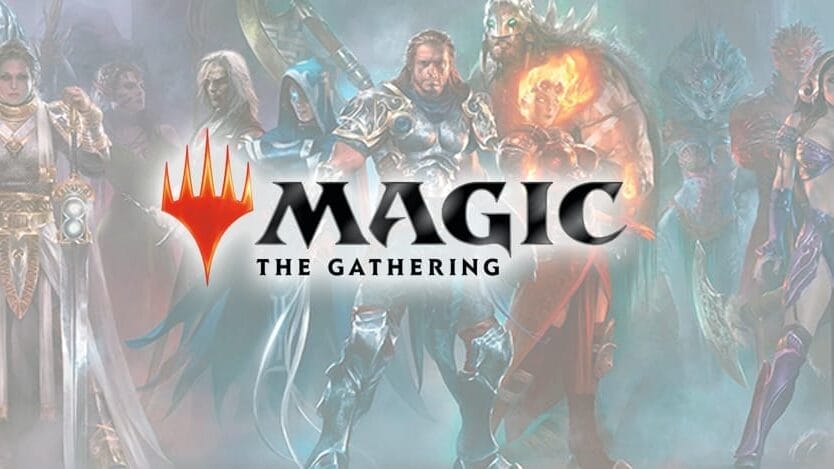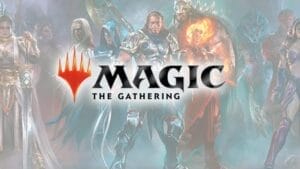
Table of Contents
I. Introducción
Have you ever wondered how a game that started in a single college dorm room has become a global phenomenon, captivating players of all ages with its strategic depth and rich narrative?
Magic: The Gathering (MTG) is more than just a card game; it’s a world where every card tells a story, every game is a battle of wits, and every tournament is a testament to skill and strategy. Originating in 1993, MTG has grown from a small hobby to a multi-billion dollar industry, with a dedicated community that spans the globe. This guide aims to take you on a journey through the mystical realms of Magic: The Gathering, from the basics of gameplay to the intricacies of deck building and tournament play. Whether you’re a seasoned player or a curious newcomer, this guide promises to unlock the secrets of mastering Magic: The Gathering.
As you embark on this journey through the magical world of Magic: The Gathering, remember that mastery comes from practice, patience, and a willingness to explore the endless possibilities that await you. So, let’s dive in and discover the secrets of mastering Magic: The Gathering together.
II. Understanding Magic: The Gathering
What is Magic: The Gathering?
Magic: The Gathering (MTG) is a collectible card game that has captivated players worldwide since its inception in 1993. Created by Richard Garfield, MTG is a strategic game where players use decks of cards to battle against each other. The game is known for its rich narrative, complex rules, and the depth of strategy it requires. Over the years, the game has evolved, with Wizards of the Coast making changes to the rules to keep the game fresh and engaging. The core of MTG revolves around two players, each with their own deck, competing against each other to reduce their opponent’s life total to zero.
Gameplay Basics
The Basics of a Turn:
- Starting Hand: Players begin with a hand of seven cards. This initial hand is crucial as it sets the tone for the game.
- Mana: MTG is powered by mana, a resource that allows players to play cards. There are five colors of mana: Red, Green, Blue, White, and Black. Each card requires a certain amount of mana to play, and players must manage their resources carefully.
- Lands: Land cards are the foundation of your deck. They generate mana, allowing you to play other cards. The color of the land determines the type of mana it produces.
- Creatures: Creatures are the primary units you’ll use to attack your opponent. They have attack and defense values and can be used to directly engage with your opponent’s creatures.
- Spells: Spells are versatile cards that can perform a wide range of actions, from attacking to protecting your creatures. Some spells are instant, meaning they can be played at any time, adding a layer of strategy and unpredictability to the game.
Strategies and Tips:
- Deck Building: The key to success in MTG is building a deck that complements your playstyle. Beginners often start with decks focused on a single color of mana, but as you progress, you’ll learn to combine different colors to create more powerful and versatile decks.
- Mulligan: If you’re not happy with your initial hand, you can take a mulligan, which allows you to discard your hand and draw a new one. This is a powerful tool for adjusting your strategy early in the game.
- Understanding Card Text: The text on a card is crucial. If there’s a conflict between the card’s text and the game rules, the card text takes precedence. This rule adds depth and complexity to the game, making it a challenge to master.
Imagine yourself as a grand strategist, commanding an army of creatures and spells. Each card in your hand is a tool in your arsenal, a piece of the puzzle that, when combined with your opponent’s, will determine the outcome of the battle. The thrill of MTG comes from the constant adaptation, the strategic planning, and the unpredictability of each game. Whether you’re a seasoned veteran or a newcomer, the journey through the magical realms of MTG is a test of skill, strategy, and imagination.
By understanding the basics of Magic: The Gathering and embracing its rich narrative and strategic depth, you’re well on your way to mastering this magical world. So, grab your deck, summon your creatures, and let the adventure begin!
III. Getting Started
Choosing Your First Deck: Tips for Selecting a Beginner-Friendly Deck
Embarking on your MTG journey, the first step is choosing the right deck. For beginners, it’s essential to select a deck that’s both accessible and rewarding. Here are some tips to help you make the right choice:
- Start with a Beginner Deck: Beginner decks are designed to be easy to play and understand, making them perfect for newcomers. They often focus on a single color or a simple strategy, which is ideal for learning the basics of the game.
- Consider the Gameplay Style: Decks can range from aggressive to control, combo, or midrange. For beginners, it’s often best to start with a deck that matches your playstyle. If you’re unsure, aggressive or control decks are great starting points as they offer a balance between simplicity and strategy.
- Look for Community Recommendations: The MTG community is vast and supportive. Check forums, social media groups, and YouTube channels for recommendations on beginner-friendly decks. Other players’ experiences can provide valuable insights and tips.
Collecting Cards: Guidance on How to Start Collecting Cards and Understanding Their Value
Collecting cards is a thrilling aspect of MTG. Here’s how to get started and understand the value of your collection:
- Start Small: Begin with a small, manageable collection. Focus on cards from the latest sets or those that are essential for your deck. As you become more familiar with the game, you can expand your collection.
- Use a Card Organization System: Organizing your cards is crucial for both efficiency and enjoyment. Consider using a system like the CCNC (color, creature, non-creature, and casting cost) to categorize your cards based on deck construction and creativity. This will make it easier to find cards when building your deck.
- Understand Card Value: The value of MTG cards can vary widely. Cards from newer sets or those with unique abilities tend to be more valuable. However, the true value of a card is often subjective and can depend on its utility in your deck or its rarity.
Building Your First Deck: Step-by-Step Guide to Creating a Basic Deck
Building your first deck is a rewarding experience. Here’s a step-by-step guide to get you started:
- Decide on Your Deck Type: Based on your playstyle and the beginner deck you’ve chosen, decide on the type of deck you’re building. This will guide your card selection.
- Select Your Colors: Decide on the colors of mana your deck will use. This is crucial as it determines the types of lands and cards you can include.
- Research and Select Cards: Use online resources, forums, and the official MTG website to research cards. Look for cards that fit your deck’s strategy and mana curve.
- Balance Your Deck: Ensure your deck has a balanced mix of creatures, spells, and lands. This balance is crucial for maintaining a steady flow of resources and mana.
- Playtest Your Deck: Before finalizing your deck, playtest it against different opponents or use online simulators. This will help you identify weaknesses and make necessary adjustments.
IV. Advanced Strategies
Deck Building for Success: Insights into Creating a Competitive Deck
Mastering Magic: The Gathering (MTG) goes beyond just understanding the game’s mechanics; it’s about mastering the art of deck building. A competitive deck is not just a collection of cards; it’s a strategic tool that can turn the tide of a game. Here are some insights into creating a deck that stands out:
- Mana Curve: The mana curve of your deck is crucial. It determines how often you can play your most powerful cards. A well-balanced mana curve ensures that you can play your key cards at the right time, maximizing their impact.
- Synergy: Look for cards that work well together. Synergy can be found in the form of cards that enhance each other’s abilities or in a deck that plays off a specific theme or strategy. A cohesive deck can often outmaneuver opponents who lack this synergy.
- Sideboard: A sideboard is a collection of cards that you can use to adapt to different game situations. It’s essential for dealing with unexpected threats or to counter specific strategies that your opponent might employ.
Gameplay Tactics: Common Strategies and Tactics for Winning Games
Winning games in MTG requires more than just having powerful cards; it requires understanding your opponent and adapting your strategy accordingly. Here are some common tactics to consider:
- Patience: MTG is a game of patience. Sometimes, the best move is to wait for the right moment to strike. Understanding when to hold your cards and when to play them can be the difference between winning and losing.
- Adaptability: The metagame in MTG is ever-changing. Being able to adapt your strategy based on what your opponent is playing can give you a significant advantage. Familiarize yourself with popular decks and understand their strengths and weaknesses.
- Bluffing: Sometimes, the best strategy is to mislead your opponent. Knowing when to bluff can help you gain an advantage, whether it’s by making your opponent believe you have a powerful card in your hand or by misleading them about your deck’s strategy.
Tournament Preparation: Tips for Preparing for Magic: The Gathering Tournaments
Competing in MTG tournaments is a thrilling experience that tests your skills and strategies against some of the best players in the world. Here are some tips to help you prepare:
- Practice: Like any skill, mastering MTG requires practice. The more you play, the better you’ll understand the game and the more effective your strategies will become. Don’t be afraid to make mistakes; they’re opportunities to learn.
- Familiarize Yourself with the Metagame: Knowing what decks are popular and how they work can give you a significant advantage. Understanding the metagame allows you to prepare for the types of decks you’re likely to face and to adapt your strategy accordingly.
- Prepare Your Deck: Make sure your deck is well-prepared for the tournament. This includes having a sideboard that can adapt to different game situations and ensuring that your deck is balanced and synergistic.
By mastering these advanced strategies and preparing for tournaments, you’ll be well on your way to becoming a true master of Magic: The Gathering. So, gather your wits, summon your creatures, and let the magic unfold!
V. The Magic Community
Joining the Community: How to Get Involved in the Magic: The Gathering Community
Dive into the enchanting world of Magic: The Gathering, and you’ll find yourself surrounded by a vibrant and welcoming community. Whether you’re a seasoned player or just starting out, there’s a place for you in the MTG community. Here’s how to get involved:
- Local Meetups: Join local Magic: The Gathering groups on platforms like Meetup. These groups are a fantastic way to meet fellow players, share experiences, and learn from each other. From Ottawa and Gatineau Gamers Group to Beaverton Table Top Card & Board Gamers, there’s a group near you.
- Online Forums and Social Media: Engage with the MTG community online. Forums like MTG Salvation offer a wealth of information and a supportive community where you can ask questions, share strategies, and connect with players worldwide. Social media platforms are also a great way to stay updated on the latest news, tournaments, and events.
Local Meetups and Tournaments: Information on Finding Local Events and Tournaments
Discovering local Magic: The Gathering events and tournaments can be a thrilling way to immerse yourself in the game. Here’s how to find them:
- Meetup Groups: Look for Magic: The Gathering groups on Meetup. These groups often organize regular meetups and tournaments, providing a great opportunity to play, socialize, and improve your skills.
- Local Game Stores: Many game stores host Magic: The Gathering events, including tournaments and casual play sessions. Check with your local game store to see if they have any upcoming MTG events.
Online Forums and Social Media: Resources for Connecting with Other Players and Staying Updated
Staying connected with the MTG community online is essential for both learning and socializing. Here are some key resources:
- MTG Salvation: This forum is a treasure trove of information for MTG players. From beginner to advanced, you can find discussions on deck building, gameplay strategies, and more. It’s a great place to ask questions and learn from experienced players.
- Facebook Groups: Join MTG community groups on Facebook. These groups are a great way to connect with other players, share your experiences, and stay updated on the latest MTG news and events.
VI. Conclusion
Magic: The Gathering is not just a game; it’s a world where every card tells a story, every game is a battle of wits, and every tournament is a testament to skill and strategy. Whether you’re a seasoned player or just starting your journey, the MTG community is a place where you can find both camaraderie and challenge.
Embarking on this journey of mastering Magic: The Gathering is akin to unlocking a treasure chest filled with enchanting spells, strategic battles, and the joy of discovery. Each card you draw, each strategy you devise, and each game you play is a step closer to becoming a true master of the game. So, gather your wits, summon your creatures, and let the magic unfold.
We invite you to share your personal experiences and tips for mastering the game. Whether it’s your favorite deck, a game-changing strategy, or a piece of advice for new players, your insights can inspire others and contribute to the rich tapestry of the MTG community. Let’s continue to weave this magical story together, sharing our triumphs, our setbacks, and our love for the game.





